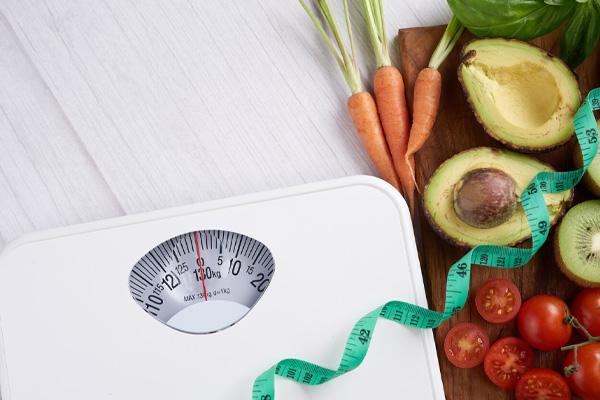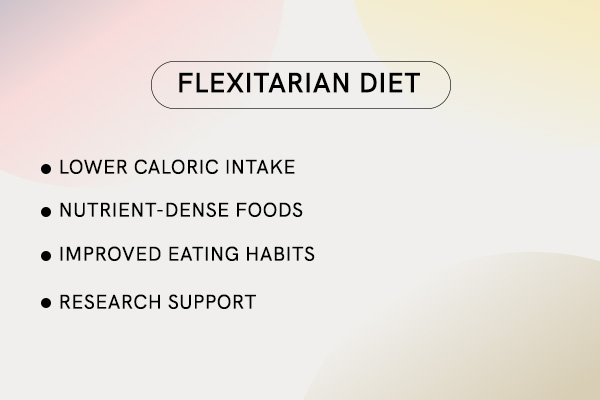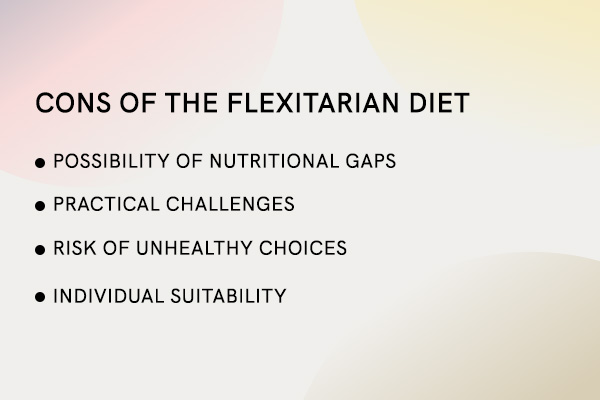Is the Flexitarian Diet Effective for Weight Loss?
Yes! The flexitarian diet supports weight loss by emphasizing plant-based foods while allowing occasional meat consumption. Key benefits include:
- Lower calorie intake – High-fiber plant foods keep you full longer.
- Nutrient-dense meals – Promotes healthier eating habits with whole foods.
- Sustainable approach – Flexible structure makes it easier to maintain long-term.
- Research-backed – Studies link plant-based diets to lower body fat and BMI.
However, meal planning is essential to avoid nutrient deficiencies and unhealthy substitutes. A flexitarian meal plan can simplify the process, making weight loss both practical and enjoyable.
When one of our patients first heard about the Flexitarian Diet from her dietitian in Dubai, she was intrigued by the idea of a diet that offered flexibility while promoting a healthier, plant-based lifestyle. “I’ve always wanted to eat healthier but wasn’t ready to give up meat entirely.
So, if you are not prepared to give up meat but still want to lose weight and live a healthier life, keep reading about this unique flexitarian diet for weight loss, which includes a free meal plan for one week.
The flexitarian Diet is a flexible version of vegetarianism. Although it is primarily vegetarian, it allows for some meat and animal products in limited amounts.
The Flexitarian Diet is great because it’s easy to change and adapt to your needs (we’ll discuss this in the next part). So, it is an excellent choice for people who want to eat more plant-based foods but still want to eat meat sometimes (not everyone is keen on following a vegan or vegetarian diet).
How the Flexitarian Diet Works?

There are three main reasons we choose this diet for those people who are not loyal to their diet and want more flexibility in their plan. This diet helps you with:
- Focus on Plant-Based Foods: It lets you eat some foods, like nuts, seeds, fruits, veggies, beans, and whole grains.
- Being Moderate with Meat: This diet allows people to eat less meat but still eat meat (limited). This way of thinking lets people enjoy their favorite foods, especially those made with meat, without feeling bad about eating their favorite dishes.
- Personal Flexibility: Many people stay on this diet for a long time because it doesn’t make them feel tense or like they have to follow strict rules. Say no to meat a few times a week, then for a whole week, and so on. This will help you slowly eat less meat. Just like with vegetables, cook them for only a short time. People won’t feel like missing out on this methodical technique, which can keep them from eating too much.
How to Plan Ahead for Your Flexitarian Meal Prep
As the name suggests, a flexitarian diet offers flexibility in choosing ingredients and the preparation process. Preparing meals in advance becomes much easier when you have a well-structured sample to guide you. A thorough sample of a flexitarian meal prep plan provides a flexible framework for your weekly meal prep, including a wide variety of foods and optional snacks. It can easily simplify your own flexitarian meal plan and allows you to swap meals or days as needed to suit your schedule.
We have included a free sample meal plan because we know you need clear examples instead of just saying too many words about it:
One-Week Sample Flexitarian Meal Plan
| Day | Breakfast | Lunch | Dinner |
| Monday | Steel-cut oats topped with sliced apples, milled flaxseed, and cinnamon | Mixed salad with greens, shrimp, corn, black beans, and avocado | Lentil soup served with whole grain bread and a side salad |
| Tuesday | Whole grain toast with smashed avocado and poached eggs | Burrito bowl featuring brown rice, black beans, and assorted vegetables | Zucchini noodles with tomato sauce and white beans |
| Wednesday | Coconut yogurt with sliced bananas and walnuts | Whole grain wrap filled with hummus, assorted vegetables, and chickpeas | Grilled salmon, baked sweet potato, and steamed green beans |
| Thursday | Smoothie made with unsweetened almond milk, spinach, peanut butter, and frozen berries | Kale Caesar salad with lentils and a side of tomato soup | Baked chicken breast served with quinoa and roasted cauliflower |
| Friday | Greek yogurt topped with blueberries and pumpkin seeds | Chard wraps filled with mixed veggies and peanut dipping sauce | Hearty lentil stew accompanied by a side salad |
| Saturday | Over-easy eggs with sautéed vegetables and a fresh fruit salad | Peanut butter sandwich on whole grain bread with crushed berries | Black bean burgers served with avocado and sweet potato fries |
| Sunday | Tofu scramble with mixed vegetables and spices | Quinoa salad with dried cranberries, pecans, and feta cheese | Stuffed bell peppers with ground turkey and a side salad |
Related article: Brown bread for weight loss
Optional Snacks:
- Hummus with assorted raw vegetables
- Greek yogurt with berries and a sprinkle of low-sugar granola
- Fresh fruit or a handful of nuts

In this diet plan, there are certain foods you can enjoy and others that are off-limits:
Foods to Eat on the Flexitarian Diet
| Category | Examples | Benefits |
| Fruits | Apples, berries, bananas, oranges, seasonal fruits | Great for snacks, desserts, or added to meals for natural sweetness |
| Vegetables | Leafy greens (spinach, kale), cruciferous vegetables (broccoli, cauliflower), colorful vegetables (bell peppers, carrots) | It can be consumed raw, roasted, steamed, or in soups and salads |
| Legumes | Beans (black, kidney, chickpeas), lentils, peas | Excellent sources of protein and fiber, perfect for salads, stews, and side dishes |
| Whole Grains | Brown rice, quinoa, oats, whole wheat bread, barley | Provide essential nutrients and help keep you full |
| Nuts and Seeds | Almonds, walnuts, chia seeds, flaxseeds | Good for snacking or adding to smoothies and salads for healthy fats |
| Plant-Based Proteins | Tofu, tempeh, seitan | Versatile options for main dishes or stir-fries |
| Dairy and Dairy Alternatives | Greek yogurt, cottage cheese, plant-based alternatives like almond or soy milk | Provide calcium and protein; choose low-fat or fortified options |
| Occasional Meat and Seafood | Lean meats (chicken, turkey), fish (salmon, tuna) in moderation | Focus on quality sources, such as organic or sustainably sourced options |
Foods to Minimize on the Flexitarian Diet
| Category | Examples | Reasons to Limit |
| Red and Processed Meats | Beef, pork, bacon, sausages | Higher in saturated fats and linked to various health issues |
| Refined Carbohydrates | White bread, pastries, sugary cereals | Opt for whole-grain alternatives to improve fiber intake |
| Added Sugars | Sweets, sugary drinks, desserts | Reducing these can help manage weight and improve overall health |
| Highly Processed Foods | Snack foods, frozen meals, fast food | Often contain unhealthy fats, sugars, and preservatives |
| High-Sodium Foods | Canned soups, processed snacks, deli meats | Aim to choose low-sodium options or prepare meals from scratch to control salt intake. |
How the Flexitarian Diet Can Help You Achieve Your Weight Loss Goals?
A flexitarian diet is a great way to reduce weight without feeling deprived. How? Let’s see it. Studies have shown that people who eat plant-based foods tend to weigh less than those who eat a lot of meat(Plant-based eating can help you lose weight without following strict diets.)
People who follow a plant-based diet also tend to have lower body fat and smaller waistlines.
Flexitarian Diet Weight Loss Benefits

- Lower Caloric Intake: The choice of plant-based foods allows individuals to consume many calories despite low quantities. The potassium content depletes fluids, leaving the individual feeling full for many hours. As a result, this can promote natural slimming without creating a viewpoint of totaling portions.
- Nutrient-Dense Foods: a diet that aims to consume large quantities of nutrient-dense foods low in saturated fat and cholesterol. Nutrient-dense foods help control the glucose level in the blood, too! And curbing the urge to eat unhealthy snacks.This can help mitigate the probability of chronic illnesses and enhance well-being.
- Improved Eating Habits: The flexitarian diet helps people be more conscious about the foods they eat, which helps to change their eating habits. This could result in better portion control, which in turn results in healthy nutrition and a healthy diet.
- Research Support: Research reveals that vegetarians and people who consume plant-based foods, including flexible diets, have lower BMI and less body fat than people who eat animal foods. This means that a flexitarian approach to weight control is possible.
After all these, our responsibility as clinics is to discuss cons if you are considering a Flexitarian Diet for Weight Loss.
Cons of the Flexitarian Diet

Possibility of Nutritional Gaps:
Even though the flexitarian diet is generally good for you, there are times when it doesn’t work. Keep an eye out for not getting enough of some nutrients. It might be a little harder to get things like vitamin B12, iron, and omega-3 that you normally get from eating animal products. Mix up your plant proteins if you’re going to be a flexitarian, and if you need to, you might want to take some vitamins.
Practical Challenges:
People who are new to plant-based food may need more time to plan and make their meals when they switch to a flexitarian lifestyle. Going out to eat can also be hard because you may have to make more careful decisions to stay on track with your diet.
Risk of Unhealthy Choices
Another thing to watch out for is when people replace meat with foods that aren’t as good. For example, they might look for processed snacks or vegetables that are high in calories. That goes against the whole point of eating better, right?
Individual Suitability:
Also, flexitarianism doesn’t work for everyone; it does work for some people. If you have certain health problems or food needs, it might not be the best choice for you. Before making big changes to your food, you should always talk to your doctor. They can help you decide if becoming a flexitarian is good for you.
If you are considering a Flexible Diet Plan and Nutrient-Rich Meals in your life, you need a professional consultation with an expert dietitian to avoid the above mistake.
Also for weight loss reduction, you have alternative options:
Fat losing option in Dubai
At ElegantHoope, we understand that achieving your ideal body isn’t always easy, and sometimes diet and exercise alone aren’t enough. So for weight loss reduction, you have alternative options as you get a diet plan from our expert.
That’s why we offer advanced fat reduction treatments and body contouring in Dubai to help you achieve the shape you’ve always wanted. Our state-of-the-art technologies focus on weight loss with machines, providing targeted solutions that work with your body’s natural processes to reduce stubborn fat and sculpt your figure.
Whether you’re looking to complement your Flexitarian Diet or want to explore non-invasive options, our expert team is here to support you every step of the way on your journey to a healthier, more confident you.
Comparing the Flexitarian Diet to Other Popular Diets
Diet | Description | Pros | Cons |
Flexitarian | Mostly plant-based with occasional meat intake | Health benefits, environmental sustainability, flexibility mayday | May require more meal planning and preparation, potential nutrideficiencies Mediterranean |
Mediterranean | Emphasizes whole foods, lean protein, and healthy fats | Health benefits, delicious cuisine, flexible | May be expensive, high in calories, potential for portion control issues |
DASH | Focuses on whole foods and limiting sodium intake | Health benefits, may reduce blood pressure | May be difficult to follow, may require significant dietary changes |
Emphasizes whole, unprocessed foods and eliminates grains can | Can promote weight loss, eliminates processed foods may | May be too restrictive, potential nutrient deficiencies | |
| Keto | High-fat, low-carb diet that encouraketosis cans | Can promote rapid weight loss, may reduce inflammation | May be too restrictive, potential for nutrient deficiencies and negative health outcomes |






